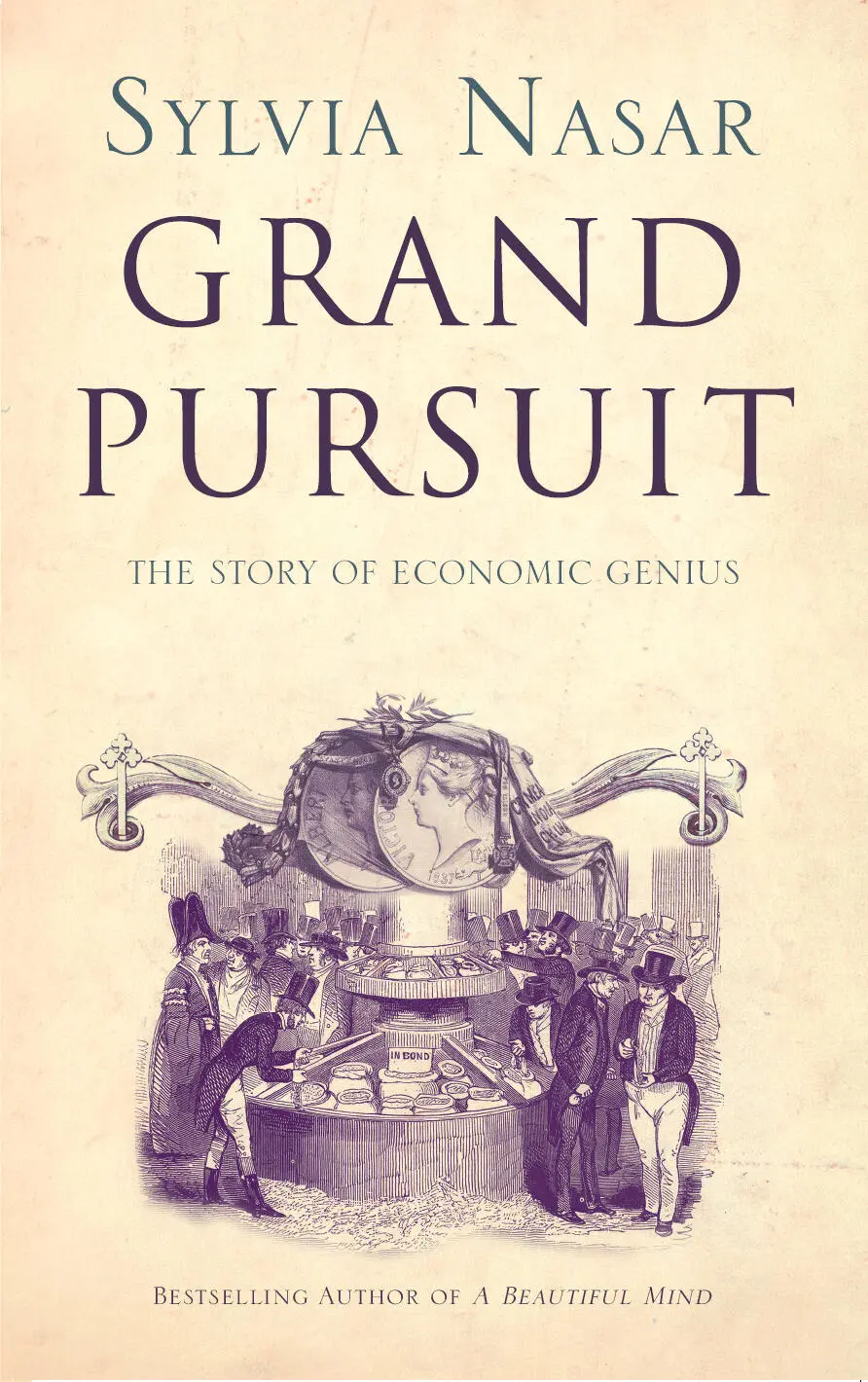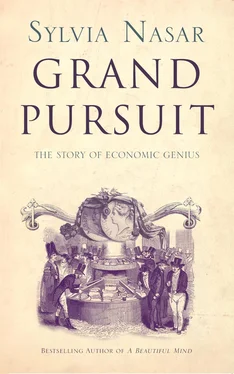
GRAND PURSUIT
Sylvia Nasar
THE STORY OF
ECONOMIC GENIUS

Dedication Contents Cover Title Page Dedication Preface: The Nine Parts of Mankind Act I: Hope Prologue: Mr. Sentiment Versus Scrooge Chapter I: Perfectly New: Engels and Marx in the Age of Miracles Chapter II: Must There Be a Proletariat? Marshall’s Patron Saint Chapter III: Miss Potter’s Profession: Webb and the Housekeeping State Chapter IV: Cross of Gold: Fisher and the Money Illusion Chapter V: Creative Destruction: Schumpeter and Economic Evolution Act II: Fear Prologue: War of the Worlds Chapter VI: The Last Days of Mankind: Schumpeter in Vienna Chapter VII: Europe Is Dying: Keynes at Versailles Chapter VIII: The Joyless Street: Schumpeter and Hayek in Vienna Chapter IX: Immaterial Devices of the Mind: Keynes and Fisher in the 1920s Chapter X: Magneto Trouble: Keynes and Fisher in the Great Depression Chapter XI: Experiments: Webb and Robinson in the 1930s Chapter XII: The Economists’ War: Keynes and Friedman at the Treasury Act III: Confidence Prologue: Nothing to Fear Chapter XIII: Exile: Schumpeter and Hayek in World War II Chapter XIV: Past and Future: Keynes at Bretton Woods Chapter XV: The Road from Serfdom: Hayek and the German Miracle Chapter XVI: Instruments of Mastery: Samuelson Goes to Washington Chapter XVII: Grand Illusion: Robinson in Moscow and Beijing Chapter XVIII: Tryst with Destiny: Sen in Calcutta and Cambridge Epilogue: Imagining the Future Notes Index Picture Section Acknowledgments About the Author Also by Sylvia Nasar Credits Copyright About the Publisher
For my parents
Contents
Cover
Title Page GRAND PURSUIT Sylvia Nasar THE STORY OF ECONOMIC GENIUS
Dedication
Preface: The Nine Parts of Mankind
Act I: Hope
Prologue: Mr. Sentiment Versus Scrooge
Chapter I: Perfectly New: Engels and Marx in the Age of Miracles
Chapter II: Must There Be a Proletariat? Marshall’s Patron Saint
Chapter III: Miss Potter’s Profession: Webb and the Housekeeping State
Chapter IV: Cross of Gold: Fisher and the Money Illusion
Chapter V: Creative Destruction: Schumpeter and Economic Evolution
Act II: Fear
Prologue: War of the Worlds
Chapter VI: The Last Days of Mankind: Schumpeter in Vienna
Chapter VII: Europe Is Dying: Keynes at Versailles
Chapter VIII: The Joyless Street: Schumpeter and Hayek in Vienna
Chapter IX: Immaterial Devices of the Mind: Keynes and Fisher in the 1920s
Chapter X: Magneto Trouble: Keynes and Fisher in the Great Depression
Chapter XI: Experiments: Webb and Robinson in the 1930s
Chapter XII: The Economists’ War: Keynes and Friedman at the Treasury
Act III: Confidence
Prologue: Nothing to Fear
Chapter XIII: Exile: Schumpeter and Hayek in World War II
Chapter XIV: Past and Future: Keynes at Bretton Woods
Chapter XV: The Road from Serfdom: Hayek and the German Miracle
Chapter XVI: Instruments of Mastery: Samuelson Goes to Washington
Chapter XVII: Grand Illusion: Robinson in Moscow and Beijing
Chapter XVIII: Tryst with Destiny: Sen in Calcutta and Cambridge
Epilogue: Imagining the Future
Notes
Index
Picture Section
Acknowledgments
About the Author
Also by Sylvia Nasar
Credits
Copyright
About the Publisher
Preface The Nine Parts of Mankind Contents Cover Title Page GRAND PURSUIT Sylvia Nasar THE STORY OF ECONOMIC GENIUS Dedication Preface: The Nine Parts of Mankind Act I: Hope Prologue: Mr. Sentiment Versus Scrooge Chapter I: Perfectly New: Engels and Marx in the Age of Miracles Chapter II: Must There Be a Proletariat? Marshall’s Patron Saint Chapter III: Miss Potter’s Profession: Webb and the Housekeeping State Chapter IV: Cross of Gold: Fisher and the Money Illusion Chapter V: Creative Destruction: Schumpeter and Economic Evolution Act II: Fear Prologue: War of the Worlds Chapter VI: The Last Days of Mankind: Schumpeter in Vienna Chapter VII: Europe Is Dying: Keynes at Versailles Chapter VIII: The Joyless Street: Schumpeter and Hayek in Vienna Chapter IX: Immaterial Devices of the Mind: Keynes and Fisher in the 1920s Chapter X: Magneto Trouble: Keynes and Fisher in the Great Depression Chapter XI: Experiments: Webb and Robinson in the 1930s Chapter XII: The Economists’ War: Keynes and Friedman at the Treasury Act III: Confidence Prologue: Nothing to Fear Chapter XIII: Exile: Schumpeter and Hayek in World War II Chapter XIV: Past and Future: Keynes at Bretton Woods Chapter XV: The Road from Serfdom: Hayek and the German Miracle Chapter XVI: Instruments of Mastery: Samuelson Goes to Washington Chapter XVII: Grand Illusion: Robinson in Moscow and Beijing Chapter XVIII: Tryst with Destiny: Sen in Calcutta and Cambridge Epilogue: Imagining the Future Notes Index Picture Section Acknowledgments About the Author Also by Sylvia Nasar Credits Copyright About the Publisher
The experience of nations with well-being is exceedingly brief. Nearly all, throughout history, have been very poor.
John Kenneth Galbraith, The Affluent Society, 1958 1
In a Misery of this Sort, admitting some few Lenities, and those too but a few, nine Parts in ten of the whole Race of Mankind drudge through Life.
Edmund Burke, A Vindication of Natural Society, 1756 2
The idea that humanity could turn tables on economic necessity—mastering rather than being enslaved by material circumstances—is so new that Jane Austen never entertained it.
Consider the world of Georgian opulence that the author of Pride and Prejudice inhabited. A citizen of a country whose wealth “excited the wonder, the astonishment, and perhaps the envy of the world” her life coincided with the triumphs over superstition, ignorance, and tyranny we call the European Enlightenment. 3She was born into the “middle ranks” of English society when “middle” meant the opposite of average or typical. Compared to Mr. Bennett in Pride and Prejudice or even the unfortunate Ms. Dashwoods in Sense and Sensibility, 4the Austens were quite impecunious. Nonetheless, their income of £210 a year exceeded that of 95 percent of English families at the time. 5Despite the “vulgar economy” that Austen was required to practice to prevent “discomfort, wretchedness and ruin,” 6her family owned property, had some leisure, chose their professions, went to school, had books, writing paper, and newspapers at their disposal. Neither Jane nor her sister Cassandra were forced to hire themselves out as governesses—the dreaded fate that awaits Emma’s rival Jane—or marry men they did not love.
The gulf between the Austens and the so-called lower orders was, in the words of a biographer, “absolute and unquestioned.” 7Edmund Burke, the philosopher, railed at the plight of miners who “scarce ever see the Light of the Sun; they are buried in the Bowels of the Earth; there they work at a severe and dismal Task, without the least Prospect of being delivered from it; they subsist upon the coarsest and worst sort of Fare; they have their Health miserably impaired, and their Lives cut short.” 8Yet in terms of their standard of living, even these “unhappy wretches” were among the relatively fortunate.
The typical Englishman was a farm laborer. 9According to economic historian Gregory Clark, his material standard of living was not much better than that of an average Roman slave. His cottage consisted of a single dark room shared night and day with wife, children, and livestock. His only source of heat was a smoky wood cooking fire. He owned a single set of clothing. He traveled no farther than his feet could carry him. His only recreations were sex and poaching. He received no medical attention. He was very likely illiterate. His children were put to work watching the cows or scaring the crows until they were old enough to be sent into “service.”
Читать дальше














